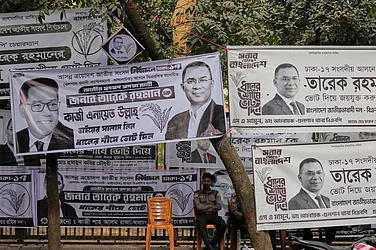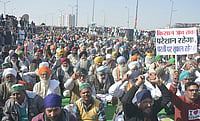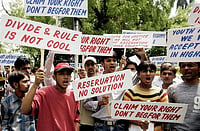The Pakistani government has evicted hundreds of thousands of Afghan refugees in the country over the past two months as part of its campaign to expel all 'illegal' foreigners in the country. The move has largely been seen as one targeting around 1.7 million undocumented Afghans in the country.
Up to 500,000 Afghans have already been expelled into Afghanistan, a country they escaped either out of hardships from wars or out of the fear of life from the Islamist group Taliban, which is now firming up its control in the country as the world has moved its attention elsewhere.
The Pakistani government's move has also come at a time when a wave of terrorism has swept across Pakistan and Afghanistan and the security situation is poor. At such a time, the expulsion of hundreds of thousands into a country where they may face renewed threats to life has also been criticised by rights advocates. The year 2023 also saw the relationship between the Taliban and Pakistan sour as border clashes were reported and Afghanistan-based Tehrik-i-Taliban Pakistan (TTP) carried out a series of deadly attacks in Pakistan that killed hundreds.
Several of Afghans expelled, in their 20s and even 30s, had lived their entire lives in Pakistan and had got married in the country and built families. Now, they are in an alien land in the midst of an authoritarian theocratic regime that rejects basic civil liberties to its people. Girls and women, of course, have it worse than men as they are denied education, most employment opportunities, and even free moment in the country. In a country where females have largely disappeared from public space, Pakistan plans to send over a million people — a country they escaped in the first place.
Why Is Pakistan Expelling Afghans?
While Pakistan has carried out eviction drives of refugees and 'illegal' residents in the past as well, nothing of this scale has ever been done.
Experts have said that even as Pakistan says the reasons for the eviction are the improvement of public welfare and safety in the country, the real reason might be related to domestic politics, a crippling economy, and a souring relationship with Afghanistan's rulers Taliban.
"Indeed, it’s clear that Afghans have become scapegoats as Pakistan weathers both one of its worst economic crises in years and a major resurgence of terrorism by the Afghanistan-based Tehreek-e-Taliban Pakistan (TTP). Last month, interim Interior Minister Sarfraz Bugti accused Afghans of being involved in organized crime and terrorism and indirectly accused them of hampering Pakistan’s economic recovery," noted Michael Kugelman, the Director of the South Asia Institute at the Wilson Center, in Foreign Policy magazine.
Therefore, it is likely that Pakistan is using the expulsion of Afghans as a pressure tactic with the Taliban. The influx of over a million people would destabilise Afghanistan, which is already battered by two rounds of earthquakes, floods, and food scarcity amid widespread cuts in international aid.
Kugelman noted that the Afghans are becoming the casualties in Pakistan's geopolitical game with the Taliban.
"Islamabad may be using the expulsion policy in part to compel the Taliban—which have condemned the move—to help more on counterterrorism. Sadly, vulnerable Afghans—from young new arrivals to older and established residents who embrace Pakistan as their only home—are becoming casualties of broader geopolitical machinations," wrote Kugelman in FP.
The Plight Of Afghans Being Expelled
Afghanistan has been plagued by wars and conflicts from decades. From the Cold War-era Soviet-Mujahideed struggle to the Taliban's takeover, the war against the Taliban, the US-led Western intervention, and then the two decades of insurgency mounted on the Afghan state by the Taliban, the conflict pushed millions out of the country, sometimes in search of a better life and sometimes for the sake of their very lives.
As many as 700,000 left Afghanistan for Pakistan following the takeover of the country by Taliban in 2021, according to Pakistani officials cited by VOA News. Now, many of them are likely to be pushed back into a country. Many of them are former staffers of the Western militaries and government agencies in Afghanistan and had escaped Afghanistan as they were being hunted.
As if this was not enough, Pakistan is also charging $830 (Rs 69,000) from every evicted refugee as an 'exit fee', which is seen as a way to bolster its crippling economy at the expense of war-ravaged Afghans. The move has been blasted by diplomats and United Nations (UN) agencies in the country and protests have been conveyed to the Pakistani government, according to The Guardian.
Khan Afzal Wafadar, whose family lived in Pakistan for eight years, summed up the plight in an Afghan saying. "There's a Pashtun proverb: 'If your bed belongs to another person, they have the power to take it from you in the middle of the night'. It's their country; they can kick us out at any time," said Wafadar to The New York Times. The newspaper reported the tales of several Afghans who have been ripped from their families and deported to Afghanistan while their families remain in Pakistan as some of them have Pakistani citizenship. One of them, Baz Gul, was born and brought up in Karachi and is married to a Pakistani woman but has been removed to Afghanistan.
In a country with little employment opportunities and civil rights, particularly to girls and women, deported Afghans stare at a bleak future. Ideally, said William Byrd of the United States Institute of Peace (USIP), Afghans should be working in other countries and sending back remittances, but now even more Afghans will now need to look for work in the already meagre Afghan economy.
With Pakistan's expulsion, hundreds of thousands of girls and women are also set to be sent to a country where they are banned from most of the education and employment opportunities; are banned from travelling unaccompanied; are told to cover head to toe; and are banned from universities, NGOs, and public spaces.


























